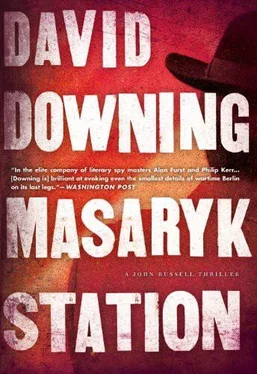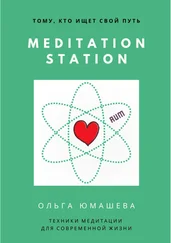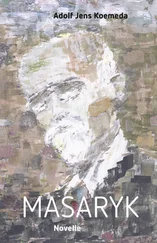David Downing - Masaryk Station
Здесь есть возможность читать онлайн «David Downing - Masaryk Station» весь текст электронной книги совершенно бесплатно (целиком полную версию без сокращений). В некоторых случаях можно слушать аудио, скачать через торрент в формате fb2 и присутствует краткое содержание. Год выпуска: 2013, ISBN: 2013, Издательство: Soho Press, Жанр: Шпионский детектив, на английском языке. Описание произведения, (предисловие) а так же отзывы посетителей доступны на портале библиотеки ЛибКат.
- Название:Masaryk Station
- Автор:
- Издательство:Soho Press
- Жанр:
- Год:2013
- ISBN:9781616952228
- Рейтинг книги:4 / 5. Голосов: 1
-
Избранное:Добавить в избранное
- Отзывы:
-
Ваша оценка:
- 80
- 1
- 2
- 3
- 4
- 5
Masaryk Station: краткое содержание, описание и аннотация
Предлагаем к чтению аннотацию, описание, краткое содержание или предисловие (зависит от того, что написал сам автор книги «Masaryk Station»). Если вы не нашли необходимую информацию о книге — напишите в комментариях, мы постараемся отыскать её.
Masaryk Station — читать онлайн бесплатно полную книгу (весь текст) целиком
Ниже представлен текст книги, разбитый по страницам. Система сохранения места последней прочитанной страницы, позволяет с удобством читать онлайн бесплатно книгу «Masaryk Station», без необходимости каждый раз заново искать на чём Вы остановились. Поставьте закладку, и сможете в любой момент перейти на страницу, на которой закончили чтение.
Интервал:
Закладка:
‘I don’t …’
‘But the real reason is, they won’t let me go. So many of your countrymen are turning up here uninvited, and I’m the only person they have who can talk to them.’
‘I see. Well, maybe I can do something about that. A local volunteer, perhaps.’
‘It would help if your people stopped planting fakes among the real defectors. Kuznakov will probably keep me busy for the next week.’
‘Ah, you spotted him, did you?’ Shchepkin said, sucking in his thin cheeks and sounding like a gratified teacher. ‘You didn’t give him up, though? He’s an idiot anyway, and I can tell my people you helped smooth his passage. We need every success we can get.’
‘We do? I thought we were doing rather well.’
‘Well, Tikhomirov and Schneider don’t agree. They know that building your credit with the Americans requires the occasional sacrifice of one of their own, but they still don’t like doing it, and they need the occasional reminder that your uses extend to the here and now.’
‘All right. But getting back to the original topic-the Americans are sending me to Belgrade in a couple of weeks, so Berlin will have to wait at least that long.’
Shchepkin was interested. ‘What do they want you to do there?’
‘They’re still deciding. As a journalist, they want me to sound out who I can, find out how real the row is between Tito and Stalin. But if past experience is any guide, they’ll also have a list of people they want me to contact. Potential allies, if they have any left, that is.’
Shchepkin was silent for a few moments. ‘There’s not much difference between journalism and espionage,’ he said eventually, sounding almost surprised.
‘One is illegal,’ Russell reminded him.
‘True,’ Shchepkin acknowledged. ‘Needless to say, we’d like copies of any reports. And there may be people we want you to see. I’ll let you know.’
‘Sounds ominous. If Tito and Stalin really have fallen out, then my Soviet “Get out of jail free” card won’t be worth much.’
‘Your what?’
‘It’s a board game called Monopoly,’ Russell explained. ‘If you land on a particular square, you end up in jail. But if you already have a “Get out of jail free” card you’re released straight away.’
‘Fascinating. And what’s the object of this game?’
‘Bankrupting your opponents by buying up properties and charging them rent each time they land on one.’
‘How wonderfully capitalistic.’
‘Indeed. But returning to the point-I won’t be much use to Berlin if I’m stuck in a Belgrade prison.’
‘I’ll bear that in mind,’ Shchepkin said, with a smile. They had completed one circuit, and were halfway through a second. Away to their left, two British warships were silhouetted against the sea and sky. ‘I was in Prague a few days ago,’ Shchepkin said, surprising Russell. The Russian rarely volunteered information about himself or his other activities.
‘Not much fun?’ Russell suggested. The Communists had taken sole control only six or seven weeks earlier, and shortly thereafter the pro-Western foreign minister Jan Masaryk had allegedly jumped to his death from a window in the Czernin Palace. According to Buzz Dempsey, the borders had been effectively closed ever since, as the Party relentlessly tightened its hold.
‘You could say that,’ Shchepkin said.
‘I expected better of the Czechs.’
‘Why?’
‘You know your Marx. An industrial society, rich in high culture-isn’t that supposed to be the seed-bed of socialism?’
‘Of course. But the Czechs have us to contend with, the peasant society that got there first. And the more civilised the country, the tighter we’ll need to screw down the lid.’
Shchepkin was right, Russell thought. It was the same everywhere. In Berlin his friend Gerhard Strohm was continually complaining that the Soviets were destroying the German communists’ chances of creating anything worthwhile.
‘Look,’ Shchepkin said, ‘I understand your reluctance to come back to Berlin …’
‘You do?’
‘I know what you were doing before you left; and you’re probably doing the same thing here. Neither side has been choosy about whom they recruited, and they’re getting less so with each passing month. Both have taken on a fair proportion of ex-Nazis. To retain your credibility as a double-agent, you have to offer up people on both sides-American agents to us, our agents to the Americans. But as far as I can tell, every last one you’ve betrayed has been an ex-Nazi. You’re still fighting the war.’
‘And what’s wrong with that?’ Russell wanted to know.
‘Two things,’ Shchepkin told him. ‘One, eventually each side will start wondering just how committed you are to fighting their new enemy. And two, you’ll soon be running out of Nazis. What will you do then?’
‘Whatever I have to, I suppose. I was hoping you’d conjure us out of all this before I reached that point. Three years ago you talked about uncovering a secret so appalling that it would work as a “Get out of Stalin’s reach” card. Didn’t some innocent birdwatcher accidentally take a photo of Beria pushing Masaryk out of his window, which we could use to blackmail the bastard?’
‘It was three in the morning.’
‘Pity.’
They both laughed.
‘We’ll meet again on Thursday,’ Shchepkin decided. ‘Here at the same time.’
It was almost midnight, but Russell still felt more restless than sleepy. He walked north up the seafront, passing groups of huddled refugees, and one suspicious stack of crates guarded by a posse of Jews-more guns for the Haganah’s war with the Arabs. Hitler had been dead for almost three years, but so many of the conflicts his war had engendered were still unresolved. A line from a long-forgotten poem came back to Russell: ‘War is just a word for what peace can’t conceal.’
It was snowing in Berlin, not hard, just a light flurry to remind the city that spring wasn’t fully established. Effi was near the back of the people gathered around the grave in the Dorotheenstadt Cemetery, among a crowd of others who had worked with the dead woman-directors and writers, producers and cameramen, other actors. She had shared three film sets with Sonja Strehl, and one theatre run back when they were both in their twenties. Effi hadn’t seen Sonja for years, and had never known her well, but still she found it hard to imagine the woman committing suicide. Sonja had always seemed so positive. About life, work, and even men. And no doubt about the children she’d eventually had, the boy and girl now standing by the open grave, looking like all they wanted to do was cry.
‘Are you coming back to the house?’ Angela Ritschel whispered in Effi’s ear.
‘For a little while.’ They were working on the same film out at Babelsberg and, like the rest of the cast, had grudgingly been given the afternoon off to attend the funeral.
‘She was good, wasn’t she?’ Angela said, a few moments later.
‘Yes,’ Effi agreed. She’d been remembering Sonja backstage at the Metropol, frantically searching through a pile of bouquets for a note from the man she currently fancied. The look on her face when she’d found it.
If truth be told, Sonja hadn’t had much a range as an actor. But she could make demure look sexy, light up a screen with joy in life, weep until you had to weep with her. And maybe that was enough. People had paid to see her, which had to mean something, Effi thought.
The service was apparently over, the crowd of mourners breaking up. There were two cars for close family, but the rest of them had to walk down Oranienburger Strasse to the house on Monbijou Platz, past the still-closed S-Bahn station and the wreckage of the old Main Telegraph Office.
Читать дальшеИнтервал:
Закладка:
Похожие книги на «Masaryk Station»
Представляем Вашему вниманию похожие книги на «Masaryk Station» списком для выбора. Мы отобрали схожую по названию и смыслу литературу в надежде предоставить читателям больше вариантов отыскать новые, интересные, ещё непрочитанные произведения.
Обсуждение, отзывы о книге «Masaryk Station» и просто собственные мнения читателей. Оставьте ваши комментарии, напишите, что Вы думаете о произведении, его смысле или главных героях. Укажите что конкретно понравилось, а что нет, и почему Вы так считаете.












